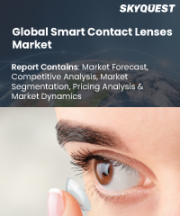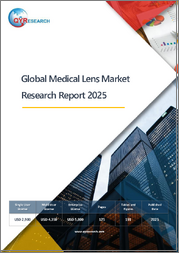
|
시장보고서
상품코드
1772685
콘택트렌즈 시장 규모, 점유율, 성장 분석 : 모달리티별, 재료별, 유통 채널별, 디자인별, 지역별 - 산업 예측(2025-2032년)Contact Lens Market Size, Share, and Growth Analysis, By Modality (Reusable, Disposable), By Material (Soft, Gas Permeable), By Distribution Channel, By Design, By Region -Industry Forecast 2025-2032 - Industry Forecast 2025-2032 |
||||||
세계의 콘택트렌즈 시장 규모는 2023년에 184억 달러로 평가되며, 예측 기간(2025-2032년)의 CAGR은 8.6%로, 2024년 199억 8,000만 달러에서 2032년까지는 386억 6,000만 달러로 성장할 전망입니다.
세계의 콘택트렌즈 시장은 시력 문제에 대한 인식이 높아지고 교정용 안경에 대한 수요가 증가함에 따라 크게 성장하고 있습니다. 편의성, 심미성, 첨단 기술로 인해 기존 안경에서 콘택트렌즈로의 전환이 두드러지고 있으며, 일회용, 컬러 렌즈, 난시 및 노안을 위한 특수 옵션과 같은 혁신은 소비자 선택의 폭을 넓혀주고 있습니다. 또한 디지털 기술의 영향과 E-Commerce의 부상으로 인해 이러한 제품들이 더욱 친숙해져 시장 확대가 가속화되고 있습니다. 또한 고령화 사회와 눈 관리를 우선시하는 라이프스타일의 변화는 콘택트렌즈에 대한 지속적인 수요를 지원하고 있습니다. 이 시장은 제조업체들이 타겟 마케팅, 제품 혁신, 유통 전략 개선을 통해 소비자와 소통할 수 있는 기회를 제공합니다.
목차
서론
- 조사의 목적
- 조사 범위
- 정의
조사 방법
- 정보 조달
- 2차와 1차 데이터 방법
- 시장 규모 예측
- 시장의 전제조건과 제한
개요
- 세계 시장 전망
- 공급과 수요 동향 분석
- 부문별 기회 분석
시장 역학과 전망
- 시장 개요
- 시장 규모
- 시장 역학
- 촉진요인과 기회
- 억제요인과 과제
- Porter의 산업 분석과 영향
- 경쟁 기업 간 경쟁 관계
- 대체품의 위협
- 바이어의 교섭력
- 신규 진출업체의 위협
- 공급 기업의 교섭력
주요 시장 인사이트
- 주요 성공 요인
- 경쟁의 정도
- 주요 투자 기회
- 시장 에코시스템
- 시장의 매력 지수(2024년)
- PESTEL 분석
- 거시경제 지표
- 밸류체인 분석
- 가격 분석
- 기술의 진보
- 규제 상황
- 사례 연구
- 특허 분석
- 무역 분석
콘택트렌즈 시장 규모 : 용도별·CAGR(2025-2032년)
- 시장 개요
- 데일리 착용
- 장시간 착용
- 기존 착용
콘택트렌즈 시장 규모 : 설계별·CAGR(2025-2032년)
- 시장 개요
- 구형
- 토릭
- 다초점
- 모노비전
- 화장품
콘택트렌즈 시장 규모 : 재료별·CAGR(2025-2032년)
- 시장 개요
- 실리콘 하이드로겔
- 가스 투과성
- 하이브리드
- PMMA
콘택트렌즈 시장 규모 : 컬러 배리에이션별·CAGR(2025-2032년)
- 시장 개요
- 불투명 콘택트렌즈
- 강화 콘택트렌즈
- 가시성 향상 콘택트렌즈
콘택트렌즈 시장 규모 : 용도별·CAGR(2025-2032년)
- 시장 개요
- 기존형
- Orthokeratology
- 장식용
콘택트렌즈 시장 규모 : 유통 채널별·CAGR(2025-2032년)
- 시장 개요
- 소매점
- 병원·진료소
- E-Commerce
콘택트렌즈 시장 규모·CAGR(2025-2032년)
- 북미
- 미국
- 캐나다
- 유럽
- 영국
- 독일
- 스페인
- 프랑스
- 이탈리아
- 기타 유럽 지역
- 아시아태평양
- 중국
- 인도
- 일본
- 한국
- 기타 아시아태평양
- 라틴아메리카
- 브라질
- 기타 라틴아메리카 지역
- 중동 및 아프리카
- GCC 국가
- 남아프리카공화국
- 기타 중동 및 아프리카
경쟁 정보
- 상위 5사의 비교
- 주요 기업의 시장 포지셔닝(2024년)
- 주요 시장 기업이 채택한 전략
- 최근 시장 동향
- 기업의 시장 점유율 분석(2024년)
- 주요 기업의 기업 개요
- 기업의 상세
- 제품 포트폴리오 분석
- 기업의 부문별 점유율 분석
- 매출의 전년대비 비교(2021-2023년)
주요 기업 개요
- Alcon Inc.(Switzerland)
- Bausch+Lomb(United States)
- Carl Zeiss Meditec AG(Germany)
- CooperVision Inc.(United States)
- Essilor International S.A.(France)
- Contamac Ltd.(United Kingdom)
- Hoya Corporation(Japan)
- Johnson & Johnson Vision Care Inc.(United States)
- Menicon Co. Ltd.(Japan)
- Novartis International AG(Switzerland)
- Oculus Inc.(United States)
- Seed Co. Ltd.(Japan)
- STAAR Surgical Company(United States)
- SynergEyes Inc.(United States)
- Tangible Science LLC(United States)
- The Cooper Companies Inc.(United States)
- UltraVision CLPL(United States)
- Visioneering Technologies Inc.(United States)
- X-Cel Specialty Contacts(United States)
- ZEISS Group(Germany)
결론과 제안
KSA 25.07.23Global Contact Lens Market size was valued at USD 18.4 Billion in 2023 and is poised to grow from USD 19.98 Billion in 2024 to USD 38.66 Billion by 2032, growing at a CAGR of 8.6% in the forecast period (2025-2032).
The global contact lens market is experiencing significant growth driven by increasing awareness of vision problems and the rising demand for corrective eyewear. A shift from traditional glasses to contact lenses due to their convenience, aesthetic appeal, and advanced technology is notable. Innovations such as daily disposables, colored lenses, and specialty options for astigmatism and presbyopia are enhancing consumer options. Moreover, the influence of digital technology and the rise of e-commerce have made these products more accessible, encouraging market expansion. Additionally, the aging population, along with lifestyle changes that prioritize eye care, supports the ongoing demand for contact lenses. This market presents opportunities for manufacturers to engage with consumers through targeted marketing, product innovation, and improved distribution strategies.
Top-down and bottom-up approaches were used to estimate and validate the size of the Global Contact Lens market and to estimate the size of various other dependent submarkets. The research methodology used to estimate the market size includes the following details: The key players in the market were identified through secondary research, and their market shares in the respective regions were determined through primary and secondary research. This entire procedure includes the study of the annual and financial reports of the top market players and extensive interviews for key insights from industry leaders such as CEOs, VPs, directors, and marketing executives. All percentage shares split, and breakdowns were determined using secondary sources and verified through Primary sources. All possible parameters that affect the markets covered in this research study have been accounted for, viewed in extensive detail, verified through primary research, and analyzed to get the final quantitative and qualitative data.
Global Contact Lens Market Segments Analysis
The global contact lens market is segmented into modality, material, design, distribution channel, and region. By modality, the market is classified into reusable and disposable. Depending on material, it is bifurcated into soft and gas permeable. According to design, the Contact Lens market share is divided into toric, multifocal, and spherical sectors. As per distribution channel, it is categorized into ophthalmologists, retail stores, and online stores. Regionally, it is analyzed across North America, Europe, Asia-Pacific, Latin America, and the Middle East & Africa.
Driver of the Global Contact Lens Market
The growing prevalence of visual impairments such as myopia, hyperopia, astigmatism, and presbyopia significantly propels the global demand for contact lenses. With a substantial portion of the population experiencing vision challenges, the search for convenient and effective alternatives to traditional eyewear is increasing. Consumers are increasingly opting for contact lenses, especially daily wear and reusable options, as they look for practical solutions to enhance their visual experience. This shift in preference from glasses to contact lenses serves as a key driver in the expansion of the global contact lens market, addressing the needs of those seeking improved vision correction solutions.
Restraints in the Global Contact Lens Market
Despite the increasing demand for contact lenses, certain factors pose significant challenges to market growth. Issues such as the risk of infections, dry eyes, and corneal ulcers associated with improper use can deter potential users from making the transition from glasses to contact lenses. Health concerns related to lens wear remain a considerable barrier, as many individuals prefer the perceived safety of traditional eyewear. Furthermore, a lack of awareness regarding lens hygiene, especially in developing regions, further complicates safe usage practices. This knowledge gap ultimately restricts the market's expansion and adoption rates among potential consumers.
Market Trends of the Global Contact Lens Market
The Global Contact Lens market is witnessing a significant trend towards the integration of smart technology within lenses, exemplified by innovations like Mojo Vision's augmented reality (AR) lenses that enhance user experience by superimposing digital information onto the real world. This growing popularity for smart contact lenses extends beyond mere vision correction, as advancements in ocular health monitoring, especially for conditions like diabetes, are attracting attention from both the tech and medical sectors. As such, these multifunctional lenses are transforming the perception of contact lenses, positioning them as essential health management tools, thereby driving demand and investment in this evolving market.
Table of Contents
Introduction
- Objectives of the Study
- Scope of the Report
- Definitions
Research Methodology
- Information Procurement
- Secondary & Primary Data Methods
- Market Size Estimation
- Market Assumptions & Limitations
Executive Summary
- Global Market Outlook
- Supply & Demand Trend Analysis
- Segmental Opportunity Analysis
Market Dynamics & Outlook
- Market Overview
- Market Size
- Market Dynamics
- Driver & Opportunities
- Restraints & Challenges
- Porters Analysis & Impact
- Competitive rivalry
- Threat of substitute
- Bargaining power of buyers
- Threat of new entrants
- Bargaining power of suppliers
Key Market Insights
- Key Success Factors
- Degree of Competition
- Top Investment Pockets
- Market Ecosystem
- Market Attractiveness Index, 2024
- PESTEL Analysis
- Macro-Economic Indicators
- Value Chain Analysis
- Pricing Analysis
- Technological Advancement
- Regulatory Landscape
- Case Studies
- Patent Analysis
- Trade Analysis
Contact Lens Market Size by Usage & CAGR (2025-2032)
- Market Overview
- Daily Wear
- Extended Wear
- Traditional Wear
Contact Lens Market Size by Design & CAGR (2025-2032)
- Market Overview
- Spherical
- Toric
- Multifocal
- Monovision
- Cosmetic
Contact Lens Market Size by Material & CAGR (2025-2032)
- Market Overview
- Silicone Hydrogel
- Gas Permeable
- Hybrid
- PMMA
Contact Lens Market Size by Colour Variation & CAGR (2025-2032)
- Market Overview
- Opaque Contact Lens
- Enhanced Contact Lens
- Visibility Tinted Contact Lens
Contact Lens Market Size by Application & CAGR (2025-2032)
- Market Overview
- Conventional
- Orthokeratology
- Decorative
Contact Lens Market Size by Distribution Channel & CAGR (2025-2032)
- Market Overview
- Retail Stores
- Hospitals and Clinics
- E-Commerce
Contact Lens Market Size & CAGR (2025-2032)
- North America, (Technology, End User, Type, Design, Distribution Channel)
- US
- Canada
- Europe, (Technology, End User, Type, Design, Distribution Channel)
- UK
- Germany
- Spain
- France
- Italy
- Rest of Europe
- Asia-Pacific, (Technology, End User, Type, Design, Distribution Channel)
- China
- India
- Japan
- South Korea
- Rest of Asia Pacific
- Latin America, (Technology, End User, Type, Design, Distribution Channel)
- Brazil
- Rest of Latin America
- Middle East & Africa, (Technology, End User, Type, Design, Distribution Channel)
- GCC Countries
- South Africa
- Rest of Middle East & Africa
Competitive Intelligence
- Top 5 Player Comparison
- Market Positioning of Key Players, 2024
- Strategies Adopted by Key Market Players
- Recent Developments in the Market
- Company Market Share Analysis, 2024
- Company Profiles of All Key Players
- Company Details
- Product Portfolio Analysis
- Company's Segmental Share Analysis
- Revenue Y-O-Y Comparison (2021-2023)
Key Company Profiles
- Alcon Inc. (Switzerland)
- Company Overview
- Business Segment Overview
- Financial Updates
- Key Developments
- Bausch + Lomb (United States)
- Company Overview
- Business Segment Overview
- Financial Updates
- Key Developments
- Carl Zeiss Meditec AG (Germany)
- Company Overview
- Business Segment Overview
- Financial Updates
- Key Developments
- CooperVision Inc. (United States)
- Company Overview
- Business Segment Overview
- Financial Updates
- Key Developments
- Essilor International S.A. (France)
- Company Overview
- Business Segment Overview
- Financial Updates
- Key Developments
- Contamac Ltd. (United Kingdom)
- Company Overview
- Business Segment Overview
- Financial Updates
- Key Developments
- Hoya Corporation (Japan)
- Company Overview
- Business Segment Overview
- Financial Updates
- Key Developments
- Johnson & Johnson Vision Care Inc. (United States)
- Company Overview
- Business Segment Overview
- Financial Updates
- Key Developments
- Menicon Co. Ltd. (Japan)
- Company Overview
- Business Segment Overview
- Financial Updates
- Key Developments
- Novartis International AG (Switzerland)
- Company Overview
- Business Segment Overview
- Financial Updates
- Key Developments
- Oculus Inc. (United States)
- Company Overview
- Business Segment Overview
- Financial Updates
- Key Developments
- Seed Co. Ltd. (Japan)
- Company Overview
- Business Segment Overview
- Financial Updates
- Key Developments
- STAAR Surgical Company (United States)
- Company Overview
- Business Segment Overview
- Financial Updates
- Key Developments
- SynergEyes Inc. (United States)
- Company Overview
- Business Segment Overview
- Financial Updates
- Key Developments
- Tangible Science LLC (United States)
- Company Overview
- Business Segment Overview
- Financial Updates
- Key Developments
- The Cooper Companies Inc. (United States)
- Company Overview
- Business Segment Overview
- Financial Updates
- Key Developments
- UltraVision CLPL (United States)
- Company Overview
- Business Segment Overview
- Financial Updates
- Key Developments
- Visioneering Technologies Inc. (United States)
- Company Overview
- Business Segment Overview
- Financial Updates
- Key Developments
- X-Cel Specialty Contacts (United States)
- Company Overview
- Business Segment Overview
- Financial Updates
- Key Developments
- ZEISS Group (Germany)
- Company Overview
- Business Segment Overview
- Financial Updates
- Key Developments



















